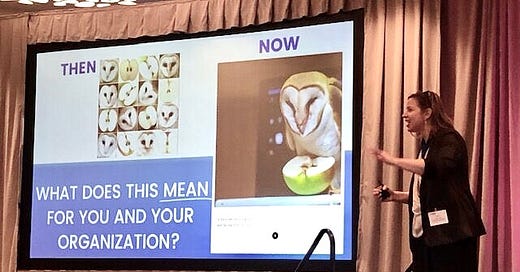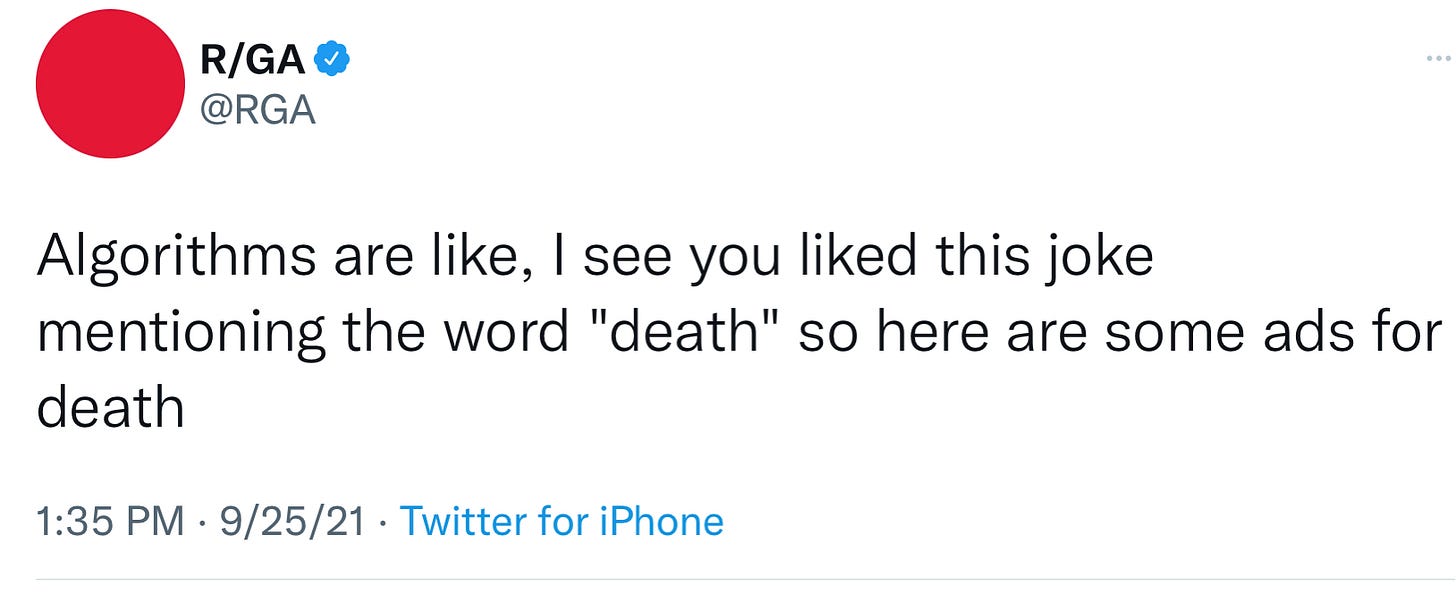Machines vs. meaning
Our minds are wired around our mortality, and to imagine other mortal minds
An executive told me the other day that his PR firm quoted him 3-4 days to finish a press release for his new project, and he bragged that he was able to replicate the task in ten minutes in ChatGPT. It didn’t seem to matter that he didn’t have any original quotes from the firm, that the facts and specifications included in the text weren’t vetted, weren’t written to appeal to the reading audience, or any of that extraneous stuff that might have made up the difference in time.
Look, I’m not saying there aren’t knowledge-based workflows that can benefit from greater automation. But our knowledge management processes in many organizations are pretty sloppy and slipshod as it is.
The relevant issue, however, goes deeper than that. Far deeper. Into the deepest recesses of human existence.
What makes humans human?
In my keynotes, I often ask audiences what they think the core human characteristics are. One of the more frequent answers is ‘creativity,’ or a synonym: problem-solving, innovation, etc.
In response to this, I point out that we humans are not alone in our creativity and problem-solving. Anyone who has seen a nature documentary has seen non-human animals use tools to achieve their aims. Ravens can be particularly creative; many people have stories about the bonds they’ve formed with ravens, and the trinkets they’ve been rewarded with.
But then I ask: what about machines? Can machines be creative? The audience always looks ponderous, and I show some AI-generated art. Until this past year, that was usually a pretty unexpected move. Most people hadn’t given much thought to AI-generated art.
Since about mid-2022, though, scarcely anyone could have avoided it. The renaissance — and yes, I’m using that word intentionally, as I’ll explain — in AI art has been mainstream, widely discussed, and open to almost anyone to play along.
The Renaissance, by the way, has been featured in a good deal of my reading lately, coincidentally. One of the theories I’ve encountered (which is popular but sometimes debunked - https://studydriver.com/coffee-tea-and-chocolate-in-the-renaissance/) is that coffee played a significant role in the clearing of the European mind.
Regardless of the facticity of the claim, it still makes an interesting metaphor for our purposes. An unexpected stimulant that jolts us out of our habits and revs up our creativity and productivity? That sounds intriguing.
Could creative AI tools bridge a gap into a new sort of human output?
But see, robust though the models may be, they are not mortal, and so they do not possess an awareness of their mortality. The difference between a potent, tangible human perspective and words that hang credibly together after having been regurgitated through a language model of the blended soup of all human perspectives is that one individual human can feel their own self, their own mortality, their own place in the universe, whereas the hydrogenated version of humanity has lost that grounded sense of mortal trajectory that we can relate to when we read it.
At least for now. Language models and generative systems will be improved; the brilliant minds of our time are working to ensure it. And they will fool us, and we will project humanity onto something that is basically three robots in a trenchcoat.
Because we can’t help but project into the mind of the people we interact with. It’s our greatest asset as humans — it’s what gives us empathy, storytelling, cultural heritage, institutional knowledge.
"I realized that what I embody, the principle of life, cannot be destroyed. It is written into the cosmic code, the order of the universe."
— Ray Kurzweil, The Age of Spiritual Machines
There is an inherentness to life that there is not to technology. Life finds a way. We make technology find a way. We have created technology out of our own ingenuity. The difference between tools and technology is parallel to the difference between learning and knowledge. One develops inherently from the other, as an aggregate set that can be communicated and taught. Other animals learn, but none so far communicate knowledge culturally. Other animals use tools, but none so far have developed technology. Do they ask questions? I don’t know if we know. But we do.
"Scientific revolutions tend to emerge not from a sudden discovery but by asking better questions."
— Lisa Feldman Barrett, How Emotions Are Made
Evolution is a kind of technology. It is also a kind of economy. There is value in advantages that are specialized to a context, so that advantage persists and thrives.
AI is evolving, practically right before our eyes. Our challenge is not so much to evolve with it, because that is a losing race. What we need is to find our footing, get grounded in our human assets, and imbue our work with the kind of meaning only a mere mortal could truly understand.
Kate O’Neill is widely known as the Tech Humanist. She is a speaker, author, researcher, entrepreneur, and advocate for a meaningful future for humanity amid data and technology-driven changes at scale. She is founder and CEO of KO Insights, a strategic advisory firm committed to improving human experience at scale.






